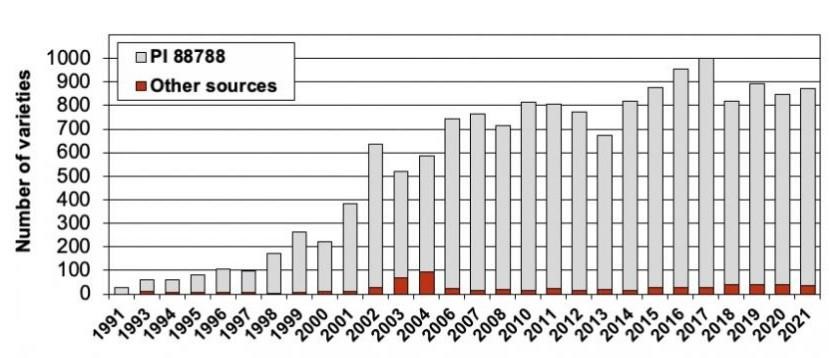There are several different soybean breeding lines, called sources of resistance, that can be used to develop SCN-resistant soybean varieties. For 30 years, PI 88788 has been the most commonly used source of resistance, with more than 95% of the varieties available for use in Iowa since 2006 containing PI 88788 SCN resistance (see figure below).
Of the 872 varieties described in the new publication, 836 or 96% have PI 88788 SCN resistance, 34 have Peking SCN resistance, and there are 2 with resistance from PI 89772. The PI 88788 resistance has been predominantly used primarily because varieties with this resistance had greater yields than varieties with other sources of resistance. But that situation is no longer true because of changes in SCN populations in the fields where they are grown, as explained below.

SCN causing yield losses in varieties with PI 88788 resistance
The yields of varieties with PI 88788 resistance may be significantly reduced by SCN because SCN populations in many fields have elevated levels of feeding and reproduction on these varieties. Soybean varieties with Peking SCN resistance can yield as much as 22 bushels per acre more than varieties with PI 88788 resistance in these fields because Peking resistance still is effective at keeping SCN feeding and reproduction in check. See the ICM Newsletter article titled Income in SCN-infested Fields Can Be $200 Per Acre Less With PI 88788 Than With Peking Resistance for a detailed example of this situation.
Farmers growing soybeans in Iowa fields infested with SCN are strongly encouraged to use soybean varieties with Peking SCN resistance in rotation with varieties with PI 88788 SCN resistance to achieve high soybean yields and to keep soil population densities of SCN in check. Peking varieties should not be used repeatedly without rotating with PI 88788 because SCN populations will become resistant to Peking resistance just as they overcame PI 88788 resistance.
Not all varieties with PI 88788 SCN resistance perform equally. Some of these varieties can still yield well, some keep SCN population densities in check, some do both, but some do neither. With soybean checkoff funding from ISA, ISU conducts the nation’s largest variety trial program and assesses yields and SCN control offered by hundreds of SCN-resistant varieties annually. Results of the annual variety evaluations are available online at Iowa State’s SCN-resistant Soybean Variety Trial Program website. Similar information may be available from other university and commercial sources as well.
Source : iastate.edu